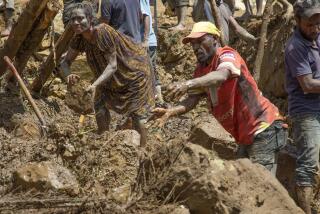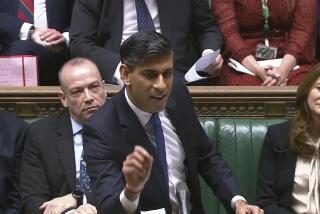Australian leader Kevin Ruddâs asylum shift tied to upcoming election
Australian Prime Minister Kevin Ruddâs decision to outsource asylum seekers to Papua New Guinea drew scorn from human rights advocates Friday and denunciation from political opponents as an approach that has already failed twice.
But the reminders that have poured into Canberra from legal and humanitarian experts that Australia may be shirking its duties under international migration covenants are unlikely to dissuade Rudd from a plan addressed to a different audience: Australian voters distressed by the mounting numbers of immigrants arriving from faraway, war-torn cultures starkly different from their own.
Elections must be held in Australia by the end of November, and Rudd, who recently ousted fellow Labor Party leader Julia Gillard from the prime ministerâs office in a back-room party coup, is mindful of the publicâs dismay over the refugee crisis that was a major part of her political undoing.
Rudd announced at a news conference in Brisbane late Thursday that he had cut a deal with Papua New Guinea Prime Minister Peter OâNeill to take in all refugees arriving by boat to Australia and to process their asylum requests for resettlement in the broader Asia-Pacific region. Rudd said anyone arriving by boat from Friday onward would have âno chanceâ of being allowed to stay in Australia.
Papua New Guinea is an impoverished country rife with corruption, ravaged by violent crime and stained with a checkered human rights record. The murder rate on the Papua New Guinea side of the island shared with Indonesia is 13 times that of Australia, the Age newspaper of Melbourne noted. Transparency International ranks the country on its corruption index as No. 150 out of the 176 states it surveys.
OâNeillâs interest in relieving Australia of its responsibility to take care of asylum seekers will come at a price for Canberra. Rudd told reporters the cost of the deal hasnât yet been calculated but that the shift of new arrivals â almost 16,000 so far this year and on track to far exceed last yearâs 17,202 â will save Australian taxpayers money in the long run.
Among the aid promised to Papua New Guinea, a country of 7 million, for becoming Australiaâs offshore refugee camp is a fivefold expansion of the current reception facility on Manus Island to accommodate 3,000 people while their asylum applications are being considered.
Rudd said his government would also be refurbishing a hospital in Papua New Guineaâs second-largest city, Lae, and expanding the Momote airport, which serves Manus island to handle international traffic.
The United Nationsâ refugee agency recently issued a report on conditions on Manus, criticizing the crowded tents and exposure to intense tropical heat as âharsh.â The report also cites the remoteness of the island as a factor contributing to mounting despair and unrest among the detainees.
Australiaâs refugee influx has come into sharp focus in recent weeks with more than a dozen deaths since mid-June among asylum seekers in overloaded boats being escorted to Christmas Island, Australiaâs offshore processing center. Since October 2009, more than 800 deaths among arriving boat people have been recorded by the Department of Immigration.
The Conversation, an online commentary forum, quoted political analysts who pointed out that it was Ruddâs party that dismantled the original âPacific Solutionâ introduced by former Prime Minister John Howard in 2001. And Gillardâs efforts to reduce the inundation through collaboration with Indonesia, the point of departure for many eventual asylum seekers, did little to deter human traffickers capitalizing on those desperate to escape oppressive governments or violence at home.
The main source countries for asylum seekers are Iran, Iraq, Afghanistan, Sri Lanka, Myanmar and Somalia, according to immigration statistics.
Kerry Murphy, a migration law lecturer at Australian National University, told the West Australian newspaper that the governmentâs new policy set a troubling example for developed countries faced with public opposition to taking in refugees.
Ruddâs plan, Murphy said, in effect is âAustralia subcontracting its obligations under the refugee convention to a poor, developing Pacific country in order to resolve a domestic political impasse.â
ALSO:
Ex-CIA chiefâs Italy saga began with 2003 kidnapping
Jailed Russian opposition leader Alexei Navalny released
N. Korea-Cuba drama boils down to useless weapons, big pile of sugar
More to Read
Sign up for Essential California
The most important California stories and recommendations in your inbox every morning.
You may occasionally receive promotional content from the Los Angeles Times.











